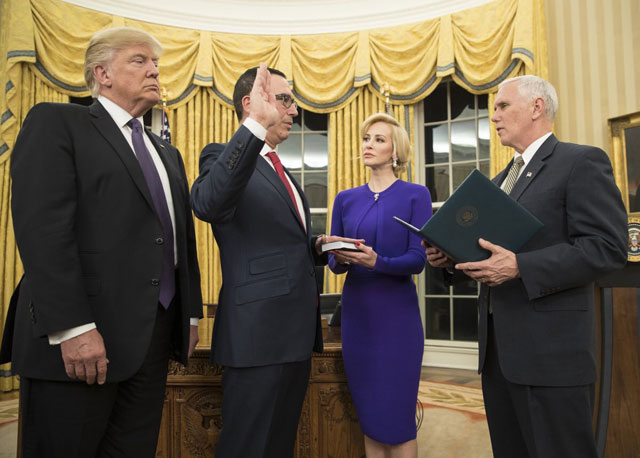
President Donald Trump thinks income generated by privately held Palisades Hudson Financial Group should be taxed at the same rate as income generated by Alphabet Inc., Google’s publicly traded parent company. And he thinks the rate for both businesses should be an attractively low 15 percent.
You might expect me to be delighted by this news. I am a Republican, and we Republicans generally believe tax rates should be as low as possible. I also happen to be the owner of Palisades Hudson Financial Group. And I would be delighted with Trump’s proposal, except for one thing: It’s a phenomenally bad idea.
To be more specific, Trump’s proposal that all business income be taxed at the same (low) rate makes rhetorical sense, but not logical sense. To see why, consider the two companies I just mentioned.
Alphabet is what tax nerds call a C corporation. It pays its own income taxes and then, when it distributes remaining income to shareholders in the form of dividends, that income is taxed again at the shareholders’ rate. This means that by the time a single dollar of Alphabet’s pretax income reaches a shareholder, federal taxes have reduced it to as little as 52 cents.
But Palisades Hudson is not taxed that way. Like nearly all owner-operated businesses, it does not pay its own taxes as a separate entity. Instead, its net income is included on the owner’s tax return and is only taxed once. This is what is meant by a “pass-through” entity. Cutting my taxes on Palisades Hudson’s net income to 15 percent would mean my income would be taxed at half the rate of the wages I pay many of my employees, or even less. And this would be the case for many firms nationwide under the proposed rules, including some much larger than mine.
Imagine this hypothetical conversation at a large law firm. A managing partner summons a senior associate to a private meeting. “Congratulations, Throckmorton,” says the senior partner. “You’re a terrific attorney and we’re promoting you to junior partner. You will now get a share of the firm’s immense profits. It won’t be a big share – in fact, it will be lower than the wages you’re getting now as an associate. But don’t worry. Since this is business income, taxed at only 15 percent, your after-tax take-home pay will reflect your exalted new position. Just don’t tell the receptionist that your tax rate is now lower than hers.”
Treasury Secretary Steven Mnuchin indicated yesterday that the administration will fight such abuses through some unspecified means. I can promise you one thing: It will be a nasty and ultimately doomed fight. The administration would have to ask the Internal Revenue Service to determine what a reasonable salary would be for someone like me to pay himself. The IRS would then need to tax that hypothetical, unpaid salary at the higher tax rate applied to wages. Imposed across millions of pass-through business entities in this country, this would be an impossible task, one that would turn taxation into an arbitrary guessing game. Such an approach is also completely unnecessary.
There is a great argument for lower corporate tax rates: to prevent companies from fleeing U.S. jurisdiction in favor of friendlier tax climes abroad. There is also no reason a foreign shareholder of a U.S. corporation should owe American taxes on income the corporation generates outside this country. Moving the corporate tax rate down to 15 percent would take us from the highest corporate rate to one of the lowest among major industrial countries.
In a perfect world, the corporate tax rate would be 0 percent, and all taxes would be paid at the level of the human beings who demand the government services those taxes fund. In the real world in which we live, a suitably low corporate tax rate addresses the objective of generating more economic activity and encouraging investment that will raise productivity and ultimately lift everyone’s living standards. But there is no economic or policy rationale for taxing the income of a business owner at a rate far lower than that of similarly compensated employees who work alongside her. Trump’s plan also calls for cutting the top tax rate on wages, but from 39.6 percent to 35 percent.
I don’t think this part of the president’s proposal has much chance of getting through Congress. But if it did, some people who are cheering it now might change their tune when they inevitably watch their best employees go into business for themselves instead.
- Bulenox: Get 45% to 91% OFF ... Use Discount Code: UNO
- Risk Our Money Not Yours | Get 50% to 90% OFF ... Use Discount Code: MMBVBKSM
Disclaimer: This page contains affiliate links. If you choose to make a purchase after clicking a link, we may receive a commission at no additional cost to you. Thank you for your support!



Leave a Reply